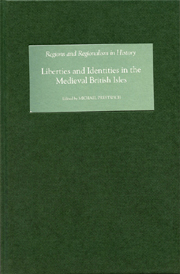Book contents
- Frontmatter
- Contents
- List of maps
- Abbreviations
- Introduction
- 1 States, liberties and communities in medieval Britain and Ireland (c.1100–1400)
- 2 Arbitration and Anglo-Scottish border law in the later middle ages
- 3 Peacekeepers and lawbreakers in medieval Northumberland, c.1200–c.1500
- 4 War, lordship, and community in the liberty of Norhamshire
- 5 The lordship of Richmond in the later middle ages
- 6 ‘Tam infra libertates quam extra’: Liberties and military recruitment
- 7 Neighbours from Hell? Living with Tynedale and Redesdale, 1489–1547
- 8 Striving for Marcher liberties: The Corbets of Caus in the thirteenth century
- 9 Franchises north of the border: Baronies and regalities in medieval Scotland
- 10 The liberties of Ireland in the reign of Edward I
- Index
10 - The liberties of Ireland in the reign of Edward I
Published online by Cambridge University Press: 12 September 2012
- Frontmatter
- Contents
- List of maps
- Abbreviations
- Introduction
- 1 States, liberties and communities in medieval Britain and Ireland (c.1100–1400)
- 2 Arbitration and Anglo-Scottish border law in the later middle ages
- 3 Peacekeepers and lawbreakers in medieval Northumberland, c.1200–c.1500
- 4 War, lordship, and community in the liberty of Norhamshire
- 5 The lordship of Richmond in the later middle ages
- 6 ‘Tam infra libertates quam extra’: Liberties and military recruitment
- 7 Neighbours from Hell? Living with Tynedale and Redesdale, 1489–1547
- 8 Striving for Marcher liberties: The Corbets of Caus in the thirteenth century
- 9 Franchises north of the border: Baronies and regalities in medieval Scotland
- 10 The liberties of Ireland in the reign of Edward I
- Index
Summary
The Welsh March is the area most often cited as a point of comparison for conditions in the lordship of Ireland, but in the case of liberties the comparison cannot be extended far. The constitutional position of the great liberties of Ireland, created during the reign of Henry II, was much more clear-cut than that of the franchises of the Welsh March, established during the reign of Henry I: in Ireland, liberties were held from the king; and it was not necessary for Edward I to extend quo warranto proceedings there simply in order to make this point clear. Indeed, in Edward's reign numerous petitions requesting liberties or their restoration testify to the fact that actual and potential holders of liberties in Ireland knew where the butter to enrich their bread came from. Given this appreciation of the rights of the crown, it is worth asking why the reign of Edward I was such a difficult time for liberty holders in Ireland. Was it the case, following the broad outlines of McFarlane's argument, that Edward I had a policy for the liberties of Ireland, a policy that spelt doom and gloom for franchise holders? Otway-Ruthven may have thought so, for the picture she painted of irish franchise holders at the end of Edward's reign was fairly bleak, albeit accurate.
- Type
- Chapter
- Information
- Liberties and Identities in the Medieval British Isles , pp. 200 - 216Publisher: Boydell & BrewerPrint publication year: 2008

